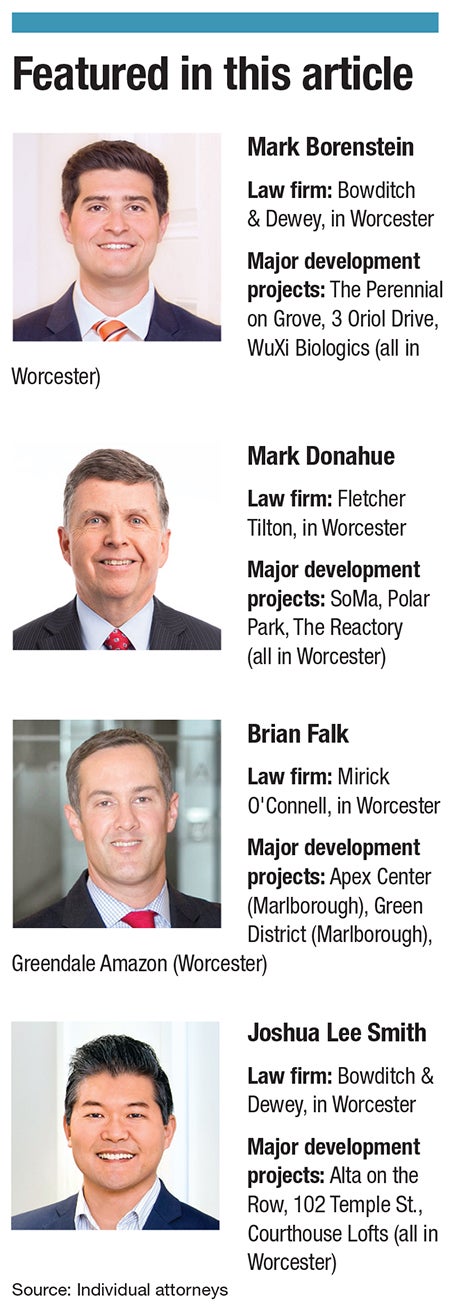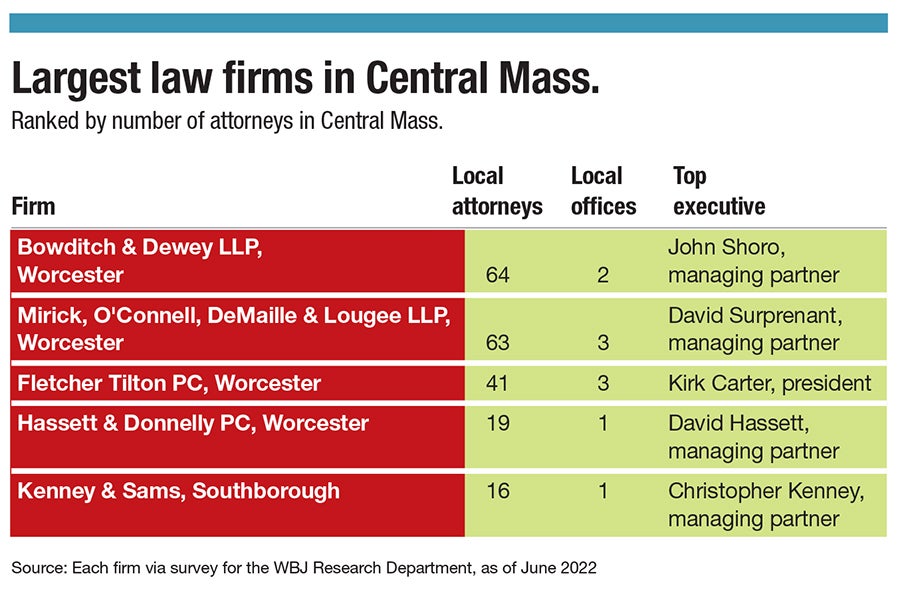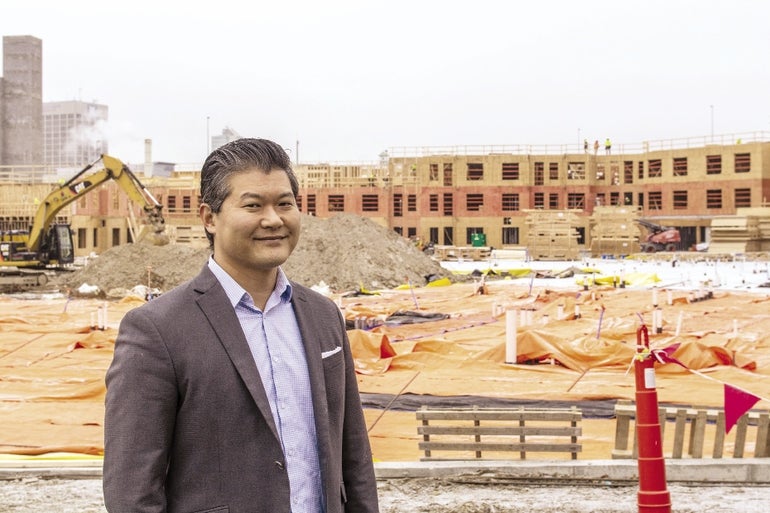Land-use attorneys help developers smooth the path with a knowledge of local codes and laws, and the ability to reach out to community leaders.
Get Instant Access to This Article
Subscribe to Worcester Business Journal and get immediate access to all of our subscriber-only content and much more.
- Critical Central Massachusetts business news updated daily.
- Immediate access to all subscriber-only content on our website.
- Bi-weekly print or digital editions of our award-winning publication.
- Special bonus issues like the WBJ Book of Lists.
- Exclusive ticket prize draws for our in-person events.
Click here to purchase a paywall bypass link for this article.
Developers are reshaping the city of Worcester: a former church is becoming 400 apartments and a parking garage, a rundown mall has become a distribution facility, a vacant industrial lot has become a minor-league ballpark.
These sorts of transformations can run into friction whether it be with zoning law, historical and environmental concerns, or concerned citizens.
Land-use attorneys help developers smooth the path with a knowledge of local codes and laws, and the ability to reach out to community leaders. They know the ins and outs of complex zoning laws, and they know the people to whom they must appeal. They know the public and can introduce the developers to the community directly or through community leaders, to try to reassure neighbors and quell opposition.

While developers, high-profile tenants, and government officials are typically the ones credited with bringing new projects into Central Massachusetts and are the ones posing for pictures at groundbreaking ceremonies and grand openings, the attorneys can be the behind-the-scenes MVPs smoothing over any rough edges and ensuring a project moves from concept to completion, especially if a developer is coming from outside the community.
“Knowing the players can be an advantage,” said Joshua Lee Smith, a partner at Worcester firm Bowditch & Dewey.
Part of being successful at the job is to do as much homework early in the game as possible, including outreach, and a local familiarity helps, said Smith.
Dealing with local rules
“Not every project needs a lawyer,” said Brian Falk, a partner with Worcester’s Mirick O’Connell.
The developers themselves or an engineer can navigate the process of getting a project approved, but in cases where a developer is not familiar with local rules, Falk said an attorney can save a developer time.
And in real estate, time is money.
Worcester has experienced an explosion of interest from developers, said Mark Donahue, the director of Worcester law firm Fletcher Tilton PC’s corporate/business and real estate practice groups.
When a developer seeks to build a project in Worcester, it could be required to seek approval from the Planning Board, the Zoning Board of Appeals, the Conservation Commission, or the Historical Commission, depending on the requirements of the project and its location.
Falk understands the importance of a local familiarity as he serves clients building in both Worcester and Marlborough. Out-of-state developers often run up against the fact each municipality has its own rules, as opposed to other states where there may be a stronger county government.
Attorneys can help developers by making sure the developer understands which rules and regulations apply to the projects, which permits and approvals are required, and whether a project fits the current zoning ordinance, said Donahue.
As Worcester evolves, properties once used for manufacturing or storage may be better suited for another use. Or in the case of the former courthouse at Lincoln Square, it was turned into mixed-income apartments. The Greendale Mall was razed and turned into an Amazon distribution facility.
Developers may need to seek exceptions to zoning rules. They may need to design a project to fit into an historical neighborhood, or ensure the project will not adversely affect the local environment.
For developers coming from Boston or out of state, local attorneys can provide value because of their understanding of their home turf, said Mark Borenstein, a partner at Bowditch.
Wood Partners of Atlanta is building Alta on the Row at the former site of Our Lady of Mount Carmel Church in Worcester. Trammell Crow Residential of Dallas has gotten the go-ahead from the city to build Alexan Worcester, a 220-unit multi-family property on Oriol Drive in Worcester. Both have Boston offices but have used local attorneys, Smith and Borenstein respectively, to guide the projects through the approval process.
“The manufacturing districts in Worcester are antiquated,” said Borenstein. “I help clients think creatively about how to make zoning work.”
Winning over regulators
One issue residential project developers run into in Worcester are the parking requirements saying each unit needs two spaces, Borenstein said.
“The City of Worcester requires too much parking,” he said.
Because properties are being built close to amenities and transit, the residents might not need as many cars, or may not be able to afford two cars per unit, he said.
Smith, Borenstein’s colleague at Bowditch, had to convince the Worcester Planning Board a 105-unit apartment building at 102 Temple St. could work with 72 parking spaces. Smith stressed the project was transit-oriented, built close to Union Station and the Worcester Regional Transit Authority bus hub. The building is expected to have a bike room and management will offer a ride-share program.
“As this neighborhood has gone through this renaissance and resurgence of development, the city has become much more metropolitan and walkable,” said Smith at the Planning Board meeting.
The project was approved.

The attorney can play a variety of roles, said Falk.
Sometimes they are only employed to get the ball rolling in the planning stages, or they can quarterback the whole process. The attorney can be the public face of the project or work behind the scenes.
Winning over the community
Falk, Smith, Borenstein, and Donahue all stressed the importance of reaching out to the community, addressing concerns like noise and traffic.
“The first thing to do is listen,” said Donahue. “Is there merit to their objections?”
Winning over concerned neighbors is difficult, Donahue said, but listening and using reason helps.
“Your house was vacant property once too,” he said.
Donahue once worked with a developer on a project where there was a community concern about the height of a building.
So he had a balloon raised to the height of the building so the concerned parties could see for themselves how the building would affect their view. The tactic was successful.
Attorneys serve as a conduit between the city, the developer, community organizations, and community leaders, Borenstein said. They helps developers become members of the community rather than taking an adversarial approach.
As a lifelong Worcester resident, he places himself in the shoes of neighbors.
“People’s minds go to the worst-case scenario,” he said.
Holding meetings and inviting leaders like city councilors creates an opportunity for clients to understand and maybe adapt a project, said Borenstein. A project may receive less opposition because of this approach.
In the past few years, Falk, Smith, Borenstein, and Donahue all said demand for their services has been strong.
Looking forward, Borenstein anticipates boards will become more picky as development increases and there are fewer underused spaces.
In residential properties, Smith sees things becoming more complicated for developers as the City of Worcester addresses the housing crisis. An inclusionary zoning ordinance is likely to pass the City Council, adding a requirement for developers to provide affordable housing with each new project.
Smith is unsure about how the landscape for development will look in the next few years, citing macroeconomic factors like high construction costs and rising interest rates.
Whatever the future brings, local attorneys will help to guide developers from near and far as they adapt to meet the area’s evolving demands.

